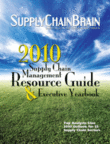
Visit Our Sponsors |
|
|
|
|
|
|
|
|
|
|
|
|
|
|
|
|
|
|
|
|
|
|
|
|
|
|
|
|
|
|
|
|
|
|
|
|
|
|
|
|
|
|
|
|
|
|
|
|
|
|
|
|
|
|
|
|
|
|
|
|

Cost is the paramount pressure driving respondent shippers to explore the usage of expedited carrier services. This manifests itself in the inclusion of three cost-related examples out of the top six cited pressures: overall (55 percent), transportation-specific (38 percent), and labor-specific (5 percent) costs. There is, however, a balance that must be struck between lowering costs and improving customer service, as evidenced by the prominence of customer demand in the hierarchy of pressures. Indeed, as recent responses demonstrate, shippers are looking to navigate an increasingly complex supply chain, reduce delivery times and lower the overall cost of operations. In approaching these goals, respondents noted an aversion toward outsourcing their carrier selection decisions, preferring to retain in-house control over this important process.
Perhaps not surprisingly, carrier performance management and freight audit and payment were the only two functional areas where respondents cited plans for increased outsourcing. Shippers have noted concerns over not only affordability, but also visibility, reliability and a lack of control over outsourced services. Neither of the areas cited for growth are core to the transportation function, in that they do not have direct bearing on delivery metrics or transportation costs. This may offer an explanation as to why shippers are more comfortable with ceding control of these functions to an outside provider since they are post-execution activities.
The Outlook
Such an explanation would also hint that other functional areas offer potential future opportunities for outsourced service providers. If concerns over reliability and control can be alleviated (through visibility and event management, collaboration, and communication), shippers may be more willing to look outside of their operations for a provider to manage those services.
RELATED CONTENT
RELATED VIDEOS
Timely, incisive articles delivered directly to your inbox.


